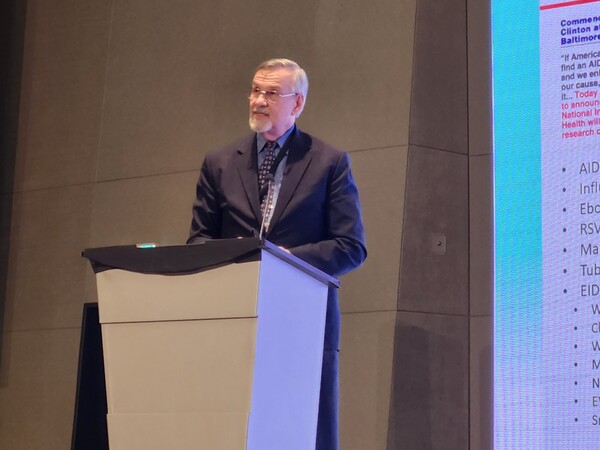“CEPI has set the 100-day mission to develop vaccines in a pandemic but we need to go a step further and aim to deploy these vaccines within six months,” Barney Graham, former deputy director of the NIH’s Vaccine Research Center, said during a global vaccine forum on Tuesday.

The fifth Global Vaccine and Immunization Research Forum (GVIRF), being held in Incheon from Tuesday to Thursday, has drawn global experts from the World Health Organization (WHO), the National Institutes of Health (NIH), the BMGF, CEPI, UNICEF, IVI, Moderna, and BioNTech in the field of vaccine and immunology. It is an invitation-only event, organized biennially by the WHO, the NIH, and the Bill & Melinda Gates Foundation (BMGF).
Graham was instrumental in the development of the Covid-19 mRNA vaccines.
He spoke about the precision antigen design with rapid platform manufacturing which provides a solution for achieving broadly protective and standardized vaccines.
“We need to start thinking about developing vaccines across virus families. There's still a lot of diseases like HIV and hepatitis C in need of immunology breakthroughs,” he noted.
“We are still not ready for influenza or paramyxoviruses, bunyavirus, enterovirus, or viruses with delayed symptoms like HIV, polyomaviruses or herpesviruses if a pandemic outbreak were to occur. With the current capacity, we cannot develop vaccines for these viruses as fast as we did for the Covid-19 virus.”
Science innovation has been amazing, Graham said.
However, he emphasized the importance of continually investing in basic research.
“Most people tell the Covid-19 success story as a one-year event but if you consider pandemic preparedness and planning, it was really a three-year story,” Graham said.
Likewise, he said that it can become an eight-year story if you consider the research that went into the antigen design and stabilizing of the CoV spike structure or even as far back as 60 years ago regarding the role of alpha helixes in stabilizing spike proteins which are now used in HIV and RSV.
He also noted the need for greater globally coordinated responses in developing prototype pathogens by sampling across virus families.
Accordingly, he suggested doing this by conducting comprehensive surveillance in low- and middle-income countries (LMICs) where biodiversity tends to be high, to develop more broadly protective vaccines.
“Science is advancing at an exponential pace but policies are lagging and we still fail to understand how achieving education, technology, and health equity has mutual benefit for high-income countries and low- and middle-income countries,” said Graham.
On this note, high- and middle-income countries should partner with an LMIC like a mentoring project, to exponentially scale research and manufacturing capacity for the next pandemic, he said.
Meanwhile, South Korea was selected this year as the host country of GVIRF in recognition of its flourishing and emerging vaccine ecosystem that expands value chains and public-private partnerships for attaining sustainable vaccine manufacturing capability, said Lee Hall, chief of parasitology & international programs branch at NIAID.
“A lot can be learned from the Korean experience,” he said.
In her welcoming speech, Jee Young-mee, the commissioner of the Korea Disease Control and Prevention Agency (KDCA), mentioned the K-Bio Global vaccine hub strategy made in 2022 together with Korea’s designation as a WHO vaccine manufacturing hub.
“The National Infectious Disease Research Center in Korea will serve as a control tower for national vaccine research and development in Korea,” she went on to say. “Coming together is a beginning, keeping together is progress, and working together will enable our success.”
The first plenary session dived into WHO's GVAP and immunization agenda (IA2030) reflecting lessons learned from GVAP, outlining new goals for GVIRF 2023 and ways to provide new priority pathogens with an expert panel from the NIAID, the Bill & Melinda Gates Foundation (BMGF), the Kintampo Health Research Centre, and the WHO.
Related articles
- Lemonex to present 'next-gen' nano-drug delivery platform at GVIRF 2023
- [Vaccine Innovation] Microneedle vaccine patches to the rescue
- [Vaccine Innovation] Advancing personalized mRNA cancer vaccines
- [Vaccine Innovation] What’s next after mRNA Covid-19 vaccines?
- [GVIRF 2023] New innovations in different vaccine platforms
- [GVIRF 2023] KDCA unveils preview into Korea’s future pandemic response strategy
- [GVIRF 2023] WHO, CEPI, AVMI say establishing regional manufacturing easy but sustaining it difficult
- [GVIRF 2023] The year 2023 is for RSV vaccines, says Johns Hopkins expert
- 'CEPI’s 100-day mission only a reality if we establish alternative clinical evidence now'

